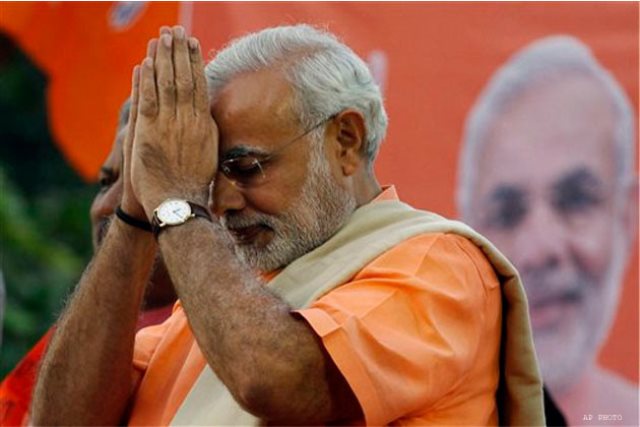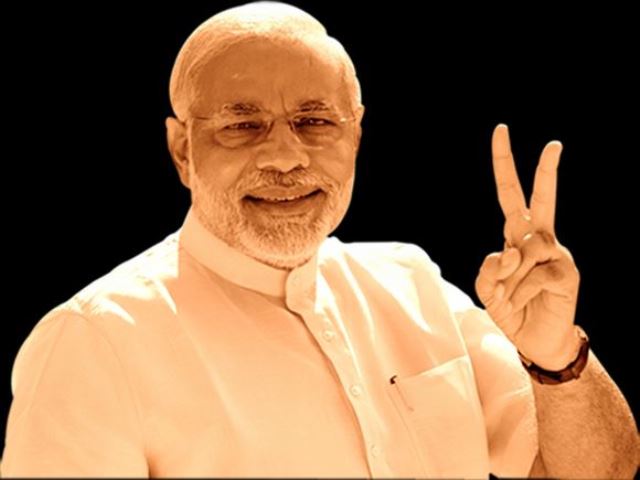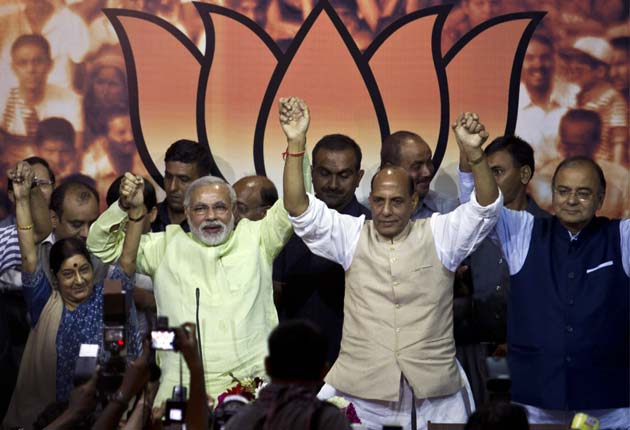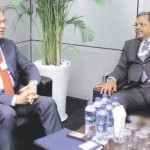Narendra Modi announced as BJP’s candidate for Prime Minister in 2014
 New Delhi : After months of deliberations and dilly-dallying, the country’s principal opposition party, the BJP, finally appointed its charismatic Gujarat leader Narendra Modi as its Prime Ministerial candidate of the party, leaving the party patriarch LK Advani sulking. More significantly, Shiv Sena and the SAD – the BJP allies in the National Democratic Alliance (NDA) – also put a seal of approval on Modi.
New Delhi : After months of deliberations and dilly-dallying, the country’s principal opposition party, the BJP, finally appointed its charismatic Gujarat leader Narendra Modi as its Prime Ministerial candidate of the party, leaving the party patriarch LK Advani sulking. More significantly, Shiv Sena and the SAD – the BJP allies in the National Democratic Alliance (NDA) – also put a seal of approval on Modi.
BJP’s big announcement is surely a perfect birthday gift from the party to its most successful, dedicated and dynamic leader, as it comes just days ahead of his birthday on September 17. The development is also significant as it not only puts to end months of speculation, media hype and hoopla, war on social networking websites, the blame game and also the bitter game to sabotage Modi’s chances of becoming the PM nominee.
It not only cements the Gujarat Chief Minister’s colossal status within the party and outside but also indicates the end of BJP veteran LK Advani’s domination in the party, which he had built along with Atal Behari Vajpayee from the scratch and transformed it into a prominent national party.
With the BJP and the RSS sealing Modi’s name for the top job, the Advani era, during which the party went on to become a national political force to reckon with riding on the ‘Rath’, finally came to an end.
 Gujarat’s impressive economic record and his resounding victory in last year’s Assembly election last year (third in a row) had catapulted Modi miles ahead of other top PM hopefuls within the party and it was then hoped that party veteran Advani will probably subside gracefully from the scene, paving way for his one-time protégé.
Gujarat’s impressive economic record and his resounding victory in last year’s Assembly election last year (third in a row) had catapulted Modi miles ahead of other top PM hopefuls within the party and it was then hoped that party veteran Advani will probably subside gracefully from the scene, paving way for his one-time protégé.
Considering Modi’s background as the hard-boiled RSS man it was almost clear that he would face little opposition from his colleagues in BJP. The party’s major worry at that time was whether there will be consensus over Modi – a highly polarising figure – among the NDA constituents (JD-U, Shiv Sena and SAD).
The party went into a huddle weighing the pros and cons of naming Modi ahead of the crucial assembly elections in many states and the 2014 polls. As the things unfolded, the JD-U, under influence of ‘secular’ Bihar Chief Minister Nitish Kumar, parted ways with the BJP, saying that Modi as NDA’s choice for PM’s job was not acceptable to them.
Initially shattered by the split, the BJP and its ideological fountainhead, the RSS, then brainstormed on the issue and finally decided to back Modi as its biggest bet for 2014. Having survived this crisis, the party faced another major one when party patriarch Advani expressed his strong opposition to naming Modi as the party’s official candidate for the PM’s post.
Advani’s first major act of rebellion against the ascension of Modi came to fore in June, when he resigned from all party posts after the Gujarat Chief Minister was picked up as the BJP’s campaign-in-charge for 2014 polls. However, intervention by the RSS persuaded him to return to the party fold.
But this was not the end of the BJP’s dilemma as the battle for one-upmanship and the prime ministerial ambition harboured by many, primarily the 85-year-old Advani, kept the central leadership on the edge.
The old guard of the party, through a coterie of his close aides, led a strident but largely ineffectual campaign against the man who he once mentored. The ageing leader, whose “inner conscience” prevented him to support Modi, allegedly predicted a “political disaster” if the BJP named the Gujarat leader as its presumptive prime minister.
Advani also wanted to BJP to postpone announcement on Modi till Assembly elections are over in MP. Advani probably thought that delaying a decision on Modi will allow him to push Shivraj Singh Chauhan, who has thrown his political weight to win the MP assembly polls for a third time in a row – something that would put him on equal footing with Modi.
With the party’s chief patron Advani not relenting, the BJP and the RSS bigwigs recently went into a huddle for two days for evolving a coordinated strategy on “ideological matters” ahead of the next year’s elections and, most importantly, decide the political future of Modi.
It was probably during this session that the RSS empowered BJP president Rajnath Singh to go ahead and declare Modi as the party’s unanimous choice for 2014 polls. The BJP’s ideological mentor believed that Modi’s surging popularity among party workers could extend to voters and thus wanted him to be declared the right man for the right job at the earliest.
However, the big cause of concern for Rajnath Singh and the RSS was not letting the party approach the game-changer 2014 polls as a divided house and that’s why the two wanted Modi to be declared a consensus candidate to counter criticism from rivals. Finally, after relentless persuasions, the RSS and the BJP chief managed to convince Advani to give up, respecting “the people’s mood, cadres’ enthusiasm and the situation in the country that favoured Modi’s immediate elevation.
By quelling the dissent and taking Advani on board, Rajnath Singh has for the time being averted a big crisis amid hopes that Modi’s “coronation” would give a much-needed thrust to the party ahead of the 2014.
But the task is yet not over for the “party with a difference” as it is yet to be seen whether Force Modi will actually manage to oust Congress in 2014 and bring his party back to the centrestage. The Modi factor and the Muzaffarnagar riots have heavily polarised the electorate, especially in UP, and if the sentiment persists till 2014 and leads to strict voting on communal lines, the political landscape of India will surely change thereafter. However, at this juncture, Modi has a tough task of keeping the party intact and preparing a blueprint for BJP’s success in 2014.
Source : Zee news


